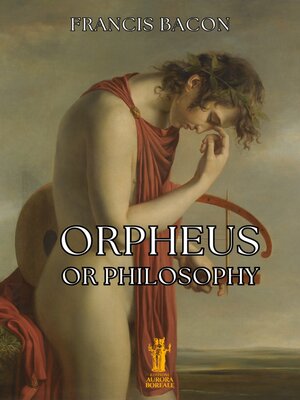
Sign up to save your library
With an OverDrive account, you can save your favorite libraries for at-a-glance information about availability. Find out more about OverDrive accounts.
Find this title in Libby, the library reading app by OverDrive.



Search for a digital library with this title
Title found at these libraries:
| Library Name | Distance |
|---|---|
| Loading... |
Francis Bacon (1561-1626) was an English philosopher and statesman who served as Attorney General and Lord Chancellor of England under King James I. Stuart. A great scholar and an initiate of many ancient schools of wisdom, Bacon argued for the importance of Natural Philosophy, guided by scientific method, and his works remained influential throughout the Scientific Revolution.
Francis Bacon's alleged connection to the Rosicrucians and Freemasonry has been widely discussed by authors and scholars in many books. Although there is no substantial evidence of Bacon's affiliation with Freemasonry, there are several elements that connect him with the Rosicrucian brotherhood and the highly secret Pythagorean Order.
The Bacon's study Orpheus, or Philosophy, which we propose to our readers today, is taken from The Wisdom of the Ancients, a philosophical treatise written by the English philosopher in the early 17th century. It is a collection of ancient myths and fables from various cultures, including Greek, Roman, and Egyptian. Bacon uses these stories to illustrate his philosophical ideas and teachings, drawing parallels between the ancient wisdom and contemporary knowledge.
Orpheus having his beloved wife snatched from him by sudden death, resolved upon descending to the infernal regions, to try if, by the power of his harp, he could reobtain her. And, in effect, he so appeased and soothed the infernal powers by the melody and sweetness of his harp and voice, that they indulged him the liberty of taking her back, on condition that she should follow him behind, and he not turn to look upon her till they came into open day; but he, through the impatience of his care and affection, and thinking himself almost past danger, at length looked behind him, whereby the condition was violated, and she again precipitated to Pluto's regions.
Francis Bacon's alleged connection to the Rosicrucians and Freemasonry has been widely discussed by authors and scholars in many books. Although there is no substantial evidence of Bacon's affiliation with Freemasonry, there are several elements that connect him with the Rosicrucian brotherhood and the highly secret Pythagorean Order.
The Bacon's study Orpheus, or Philosophy, which we propose to our readers today, is taken from The Wisdom of the Ancients, a philosophical treatise written by the English philosopher in the early 17th century. It is a collection of ancient myths and fables from various cultures, including Greek, Roman, and Egyptian. Bacon uses these stories to illustrate his philosophical ideas and teachings, drawing parallels between the ancient wisdom and contemporary knowledge.
Orpheus having his beloved wife snatched from him by sudden death, resolved upon descending to the infernal regions, to try if, by the power of his harp, he could reobtain her. And, in effect, he so appeased and soothed the infernal powers by the melody and sweetness of his harp and voice, that they indulged him the liberty of taking her back, on condition that she should follow him behind, and he not turn to look upon her till they came into open day; but he, through the impatience of his care and affection, and thinking himself almost past danger, at length looked behind him, whereby the condition was violated, and she again precipitated to Pluto's regions.







